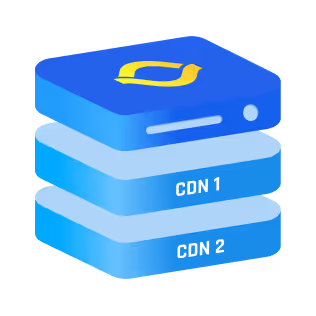In the web world, where website performance is crucial for user experience and business growth, one must recognize the power of efficient caching techniques. Central to this mechanism are Content Delivery Networks (CDNs), which harness cache keys to serve content faster and more efficiently.
Through intelligent manipulation and customization of cache keys, web developers and administrators can fine-tune the CDN's caching behavior to enhance the overall web performance.
What is Cache Key?
A Cache Key is a unique identifier CDNs store and retrieve cached content. Whenever a user makes a request to a website, such as accessing an image or a web page, the CDN uses the Cache Key to find the requested content in its cache. If the content is found, it is delivered to the user swiftly, leading to a cache hit. Conversely, if the content isn't found, it results in a cache miss, and the requested data is retrieved from the origin server and then stored in the cache for future access.
The construction of a Cache Key is typically based on the URL of the requested resource. However, it can also be customized and enriched with additional parameters like query strings, headers, or cookies. This customization of cache keys allows for more granular control over the caching behavior, enabling the CDN to handle diverse content and varying user requests more effectively.
Cache Keys play an important role in determining the cache hit ratio, a metric that indicates the effectiveness of the cache in handling user requests. A higher cache hit ratio signifies that more user requests are being served directly from the cache, contributing to faster content delivery and a better user experience.
{{cool-component}}
Anatomy of a Cache Key
A cache key is your CDN’s fingerprint for a piece of content; unique enough that no two fingerprints ever collide, yet stripped of the smudges that would make every request look different.
Most vendors build that fingerprint from three primary ridges:
Additional traits, such as protocol (HTTP/2 vs HTTP/3), device type, or GeoIP - can be salted into the key for ultra-tailored content. The trick is knowing which traits are signal and which are noisy static.
Default vs. Custom Key Components
Out of the box, most CDNs default to URL-only keys: scheme + host + path, ignoring everything else. That keeps hit ratios high but can bite you when, say, ?lang=jp needs a Japanese banner or ?token=abc must never be shared.
Custom keys let you surgically include (or exclude) extra parts:
- Include the query string for immutable blobs like file.js?v=hash, but strip marketing params such as utm_campaign.
- Vary on a single header (e.g., Accept-Encoding) to serve Brotli and GZIP side-by-side without exploding the cache.
- Hash sensitive items such as signed URLs so user-specific secrets never form a public key.
Think of the default key as a factory-issue multitool: handy for 80 percent of jobs. Customizing turns it into a bespoke Swiss Army knife; adding exactly the blades you need, shedding the ones you don’t, and ensuring every slice through your traffic is clean, fast, and safe.
How Cache Key Influences Web Performance
The efficiency of a Content Delivery Network (CDN) hinges on its ability to use caching mechanisms effectively.
Central to this is the Cache Key, which can greatly amplify web performance.
Here’s how it works:
Efficient Content Retrieval:
Upon receiving a user request, the CDN uses the Cache Key to locate the requested content in its cache swiftly.
If found (a cache hit), the content is rapidly served from the nearest cache location, minimizing data transmission time.
Minimized Origin Server Load:
Optimized cache keys lead to higher cache hit ratios.
This lessens the load on origin servers, reducing hosting costs and ensuring server responsiveness, especially during traffic surges.
Advanced Content Management:
Cache Keys can be customized for detailed control over caching behavior. For instance, CDNs can serve dynamic content based on user preferences or profiles by utilizing parameters like cookies or headers. Additionally,
Cache Keys allow CDNs to manage content delivered through URL variations like query strings without getting bogged down by minor differences.
Reduced Cache Fragmentation:
Optimally configured Cache Keys mitigate fragmentation arising from multiple cache entries for identical content due to slight header differences or query parameters.
This leads to improved cache storage and higher hit ratios.
Benefits of Utilizing Cache Keys
Leveraging Cache Keys brings numerous advantages, enhancing web performance and the user experience.
Here’s an in-depth look:
- Speedy Content Delivery:
Cache Keys promote immediate content access from a CDN's cache, guaranteeing prompt data delivery to users. This is especially vital for applications reliant on real-time data. - Cost Efficiency:
Optimized Cache Keys lead to fewer requests to the origin server, saving on bandwidth and infrastructure expenses. - Personalized User Experience:
Customized Cache Keys let CDNs serve content tailored to individual users, such as regional content or user settings, without overloading the origin server. - Reduced Latency:
Thanks to Cache Keys, most user requests are directly served from nearby caches, reducing data transmission time. - Harmonized Multi-CDN Strategies:
For those implementing multi-CDN strategies, uniform cache key configurations across CDNs guarantee consistent caching and content delivery. - Comprehensive Control:
Cache Keys give web administrators the liberty to define caching rules. This ranges from deciding cache durations to handling query string impacts on caching or strategizing for multi-CDN setups.
Conclusion
In essence, Cache Keys not only reduce the strain on origin servers but also pave the way for tailored user experiences and cost efficiencies. They reduce server load and provide that extra ‘fine-tuning’ capability to bump your CDNs from A tier to S tier.
FAQs
What is a cache key in the context of CDNs and web caching?
A cache key (sometimes called a cacheable key) is the string or hash a CDN uses to label each stored object. It acts like the primary key in a database: one unique identifier per asset, ensuring the edge can quickly decide whether it already has the requested content.
How does a cache key function as a unique identifier for cached content?
When a browser requests /img/logo.svg?v=2, the CDN concatenates chosen fields (scheme, host, path, maybe query) and hashes them into an encrypted cache key. The computed key maps 1-to-1 with the file; if it matches what’s in memory, the CDN instantly serves that entry instead of re-fetching it.
Why are cache keys critical for efficient content delivery and web performance?
Smart keys raise hit ratios, slash latency, and reduce origin traffic. Conversely, a bad key can flood storage with duplicates or trigger “failed to compute cache key” errors, forcing every request back to the origin and neutralizing the CDN’s speed advantage.
What elements typically make up a cache key?
By default: protocol, host, and URI path. Optional parts (query strings, certain cookies, Accept-Language, or device headers) can be appended. Add too many and you risk fragmentation; add too few and you may leak data. Striking the right balance keeps the key unique yet broadly reusable.
What are the main benefits of optimizing cache keys for a website or application?
Fine-tuned keys deliver faster pages, lower egress costs, and simpler purging workflows. They also prevent “docker failed to compute cache key” build warnings or other mis-hash issues that slow CI/CD pipelines. In short, optimized keys convert your CDN from a blunt cache into a precision performance tool.
How do cache keys enable personalized content delivery and support dynamic web experiences?
By selectively including cookies, GeoIP headers, or A/B test tokens, a key can segment the cache per persona. The edge then delivers tailored HTML, localized pricing, or user-specific images without touching the origin on every hit; dynamic behavior powered entirely by strategic cache-key design.



.png)
.png)
.png)






